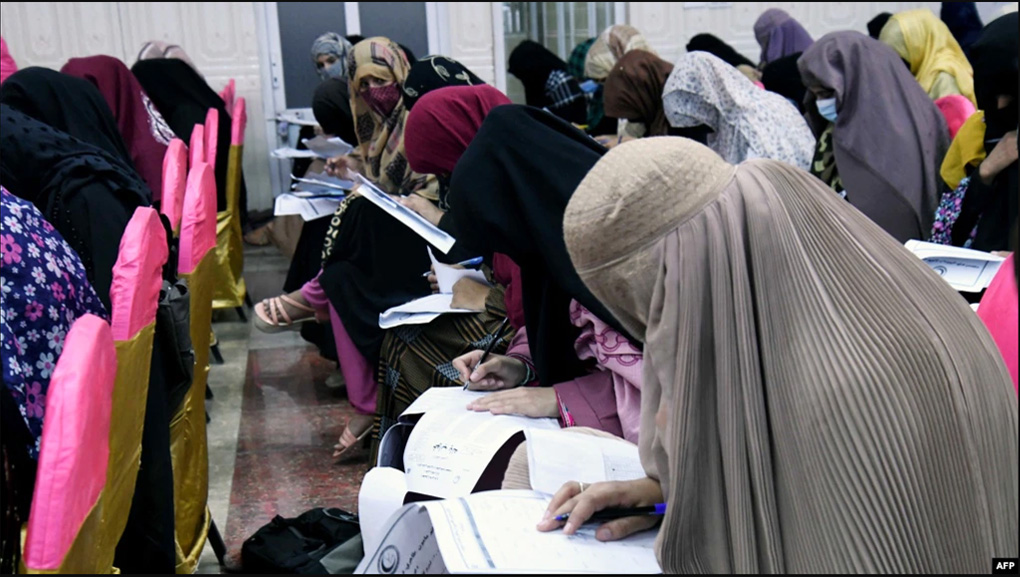
A large group of women activists in Afghanistan’s capital Tuesday staged a protest rally against the expulsion of dozens of female students from a Kabul University hostel by Taliban authorities.
The demonstrators, including students, gathered outside the university campus, chanting, “Education is our red line” and “silence is treason.”
Rally participants accused the Islamist Taliban-led ministry of higher education of expelling at least 40 female students over the past few days from the school, one of the country’s oldest and most revered institutions.
A ministry statement confirmed on Sunday that several women had been removed from the dormitory for violating university regulations, but it shared no further details.
“The students were punished for attending a protest rally against the attack on the Kaaj education center,” Lilia Baseem, who attended Tuesday’s rally, told VOA.
She referred to the September 30 suicide bombing of the private school in a western Kabul neighborhood that killed 53 people, including 46 girls and women. Another 110 people, mostly women, were wounded.
The carnage outraged female activists and students who had taken to the streets in several major cities, including Kabul, shortly after the attack to condemn it and seek justice for the victims.
The Taliban said an investigation was under way, but the Islamist rulers have not yet shared its outcome and no group has claimed responsibility.
The Taliban retook control of Afghanistan in August 2021 and subsequently formed a men-only interim administration to govern the war-torn country. The regime, however, has yet to be formally given legitimacy by any country mainly over human rights concerns and a lack of political inclusiveness.
The hardline group has imposed a series of restrictions on women since coming to power, limiting their access to work and education. Most public sector female employees have been instructed to stay at home and women journalists must appear on TV with a face covering.
While public and private universities across the country are open to women in a strictly gender-segregated system of education, the Taliban, in violation of their public pledges, have barred teenage girls in grades seven through 12 from attending school.
The group reneged on repeated pledges that it would lift the ban in March. The backtracking prompted the U.N. Security Council weeks later to reinstate foreign travel restrictions on two Taliban education ministers. Dozens of members of the government have long been subjected to targeted U.N. travel and asset freeze curbs.
Tuesday’s demonstration comes a day after reclusive Taliban chief Hibatullah Akhundzada appointed Nada Mohammad Nadeem as the new acting minister of higher education. The official announcement gave no reason. Nadeem has replaced Abdul Baqi Haqqani, who was among the ministers barred by the United Nations from traveling abroad.
The international community has persistently pushed the Taliban rulers to reverse policies and practices that are restricting the human rights of Afghans, particularly those of women and girls.
The radical group has defended its polices, saying they are in line with Afghan culture and Islamic injunctions.
Last week, the United States announced a new visa restriction policy as punishment for current or former Taliban leaders and others “believed to be responsible for, or complicit in, repressing” Afghan women and girls through restrictive policies and violence. Washington called on its allies to follow suit.
The Taliban rejected the U.S. move as an obstacle in the development of bilateral ties.
Last week, Akhundzada reiterated in an audio message apparently in response to new U.S. sanctions that his government "is ready to engage with the world within the within the framework of Sharia and the interests of our people.” Sharia is Islamic law.
He added that regardless of foreign pressure, Afghan scholars are reviewing all laws introduced over the past 20 years by former U.S.-backed rulers in Kabul to bring them in line with Sharia.
Taliban officials said their supreme leader was speaking to a gathering in the southern city, Kandahar, regarded as the group’s ideological headquarters.
The Taliban government has also blocked young girls from taking university entrance exams this year for a wide range of subjects, including civil engineering, journalism, veterinary studies, agriculture and geology, deeming them difficult for women to handle.
The education system in Afghanistan has worsened since the Taliban returned to power more than a year ago, jeopardizing children’s futures, particularly girls, according to the latest report by Save the Children. "The majority of secondary school girls — about 850,000 out of 1.1 million — are not attending classes,” the organization said.



